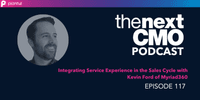Top 8 Questions to Quickly Evaluate a Fractional CMO
Alan Gonsenhauser
Principal and Founder, Demand Revenue
When private equity and venture portfolio companies require significant assistance building their marketing organization and infrastructure, where do they start? Do they have the time and resources to hire a full-time Chief Marketing Officer (CMO)? What about losing valuable time and momentum during gaps of employment?
Portfolio companies require the right balance of focus, strategy, and execution to ignite growth during times of transition. Finding such a full-time key strategic resource takes a significant investment of resources and time. Hiring the right fractional CMO (also known as an outsourced CMO or interim CMO) can address the time element and leverage the company’s ongoing momentum.
Here are the eight questions to consider when bringing on a fractional or outsourced CMO:
1) Do they understand the company’s ecosystem?
Can they demonstrate industry expertise (e.g., in medical device, digital health or Health IT) along with success? Have they been both a full-time CMO and a fractional/outsourced CMO in the past? You may have a colleague who’s been a CMO, but they may be untested as an interim CMO. Does this candidate have diverse domain expertise? Can they understand the ecosystem, so they can help evolve the company’s approach and accelerate growth? Can they go beyond answering general questions by actually taking the time to understand the business, business needs, and then help frame the right challenges and then address them quickly?
2) Can they gain the respect of, and alignment with, the C-suite quickly?
A fractional CMO must establish relationships quickly to bring about alignment between marketing, sales, product, compliance, and other key C-suite leaders, especially the CFO. In addition, can the candidate speak the language of business? Do they understand what is important to each C-suite leader, and can they address key priorities quickly? Such alignment and action provide meaningful economic benefits in terms of scale and efficiency.
3) Do they have forward-looking vision?
Can they look beyond incremental improvement, think differently, and add value for new and better outcomes? It’s easy enough to create a plan and get tasks done, but can they tie tasks to a larger integrated vision of what marketing should be—that is an engine for growth rather than a cost-center? Can they bring new thinking to old problems and find new solutions?
4) Is this interim CMO candidate a strong cultural fit?
Do they have a “can-do” attitude and willingness to help? Are they problem solvers or problem makers? Do they have the right expertise, networks, and approach to help win new customers, keep them happy, and make them long-term advocates of your brand?
5) Can they help close sales?
Has this candidate been in the field? Do they know how to speak to your customers and prospects? Such experience shows they understand the bottom-line actions; everything they do—from strategy to execution—is focused on gaining more customers and making them long-term allies and advocates for your business.
6) Can they “question your questions” and confront the status quo without being confrontational or alienating?
Can they show you how they challenge conventional thinking and status quo without being confrontational and be non-threatening? Can they address these issues in a manner that helps move the business forward? Can they build consensus and break down silos so that people focus on gaining, retaining, and growing customers rather than internal struggles?
7) Do they have a deep toolkit and bench, or just “one hammer?”
Does your fractional/interim CMO candidate have many resources they can bring to bear to achieve success? Have they been exposed to a rich variety of models and frameworks and best practices in their background? Do they have a network of PR or social media people, go-to-market strategists, sales operations specialists, customer engagement and enablement professionals, or designers—resources they can bring online at a moment’s notice to create a virtual marketing team?
8) Can they pivot from outsourced CMO to CMO Executive Advisor or coach when the time comes?
Once you find the right full-time CMO, often with the interim CMO’s help, can this candidate easily transition from a “quarterback to a coach” and help the new full-time CMO situate themselves in their new role? Can they advise and help them get up to speed and be successful long term? Can they ensure that operational infrastructure is in place, so the new CMO can concentrate on large strategic issues rather than tactical concerns? Are they only a fractional CMO/interim CMO or are they also experienced as a CMO Executive Advisor, Coach, and Mentor? Ask them for specific references.
The answers to these questions are “binary” in nature. If the majority of answers are “yes,” you found the right person. If not, you need to ask what you will trade off or keep looking.
That said, when the marketing team is small (or even non-existent), an interim CMO can provide employees with a leader to help on current projects and provide the industry acumen, creativity, and guidance necessary to lay the foundation for future innovation, growth, and long-term success.
Demand Revenue accelerates private equity and venture portfolio company ROI by providing Interim CMO (Chief Marketing Officer) Fractional CMO, CMO Executive Advisor & Coaching, and a host of strategic marketing services, and keynote presentations, during critical phases of company transitions at B2B SaaS and Systems health IT, medical device, digital health, and technology and software firms. Visit Demand Revenue to learn more.

